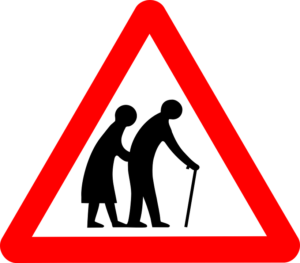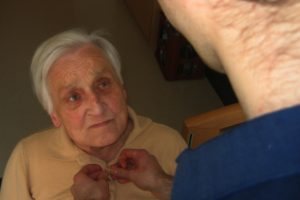How are you doing is a simple and common enough question. Most likely, it is just another way to say hello. But if we reflect on it, our usual answer of ok is not thorough, complete nor accurate. In order to gain a precise and true insight into how you are doing and also feeling, please take some time and ask for help. You definitely owe it to yourself.
You and we Together Helping Seniors will strive to analyze how well you are living. Then together we choose wisely the most preferred road that leads to many happy senior years. So to maximize your time and quality of life, someone needs to assess fully your health and wellbeing which is what a geriatric doctor is especially trained to do. A senior care specialist will put you in contact with a board certified geriatrician who medically treats older patients much like the pediatrician is the specialist for young people.
 A geriatrician assesses how well you are coping with the aging process. In fact, the answer to how you are doing medically involves a complete geriatric assessment. Accordingly, the clinician takes a look at the various domains of senior living in order to see how you are functioning in each one. An area is probed straight forwardly to determine if any further and more in depth assessment is necessary. If yes, then further questions and tests will gauge the severity of the deficit. A geriatrician will examine nine general domains above and beyond your existing medical conditions, for example, if you already are diagnosed with hypertension, a fracture, congestive heart failure and diabetes.
A geriatrician assesses how well you are coping with the aging process. In fact, the answer to how you are doing medically involves a complete geriatric assessment. Accordingly, the clinician takes a look at the various domains of senior living in order to see how you are functioning in each one. An area is probed straight forwardly to determine if any further and more in depth assessment is necessary. If yes, then further questions and tests will gauge the severity of the deficit. A geriatrician will examine nine general domains above and beyond your existing medical conditions, for example, if you already are diagnosed with hypertension, a fracture, congestive heart failure and diabetes.
It takes a bit of time to go through the nine areas of the geriatric assessment. First, there is functional status which is whether you need any personal assistance to complete a task that is related to self-care such as bathing, walking, preparing meals, taking medications and managing the household finances. A second dimension assesses what is called the up and go activity or the objective mobility task. This involves having the sitting senior stand up from a chair, walk ten feet forward then back and sit down again with the aim of completing the activity in less than 15 seconds. The third domain for assessment deals with nutrition especially with respect to any weight loss or gain of five percent or more in the previous six months or an abnormal body mass index which are both reasons for concern. A fourth area is with respect to eyesight. A vision check with the ability to read while wearing corrective lenses with either one or both eyes at a level of 20/40 is a good test result. A fifth domain determines if you can hear a whisper of a letter and number combination within two feet. If so, you are doing well. A sixth dimension of the geriatric assessment has to do specifically with medications, i.e. the dose, schedule and adherence.  Do you remember to take the pills and drugs or maybe you not because they are too expensive or a side effect is uncomfortable? The seventh dimension is your cognitive functioning ability which can be checked simply by asking you to remember and recall three items after one minute. The eighth area for evaluation involves your psychological status. This is determined from answering two questions: one have you had in the past month any feelings of being down, depressed or hopeless and two have you lost interest or pleasure in doing things? The ninth assessment appraises your social functioning. A number of social fields such as the availability of a support system, mistreatment, financial status, care giver burden and the patient’s advanced directives are investigated over a period of several visits. Having completed this total geriatric assessment, you and your clinician can judge well the original question “How are you doing?” In fact, you can now honestly answer in a way that is complete, thorough and accurate.
Do you remember to take the pills and drugs or maybe you not because they are too expensive or a side effect is uncomfortable? The seventh dimension is your cognitive functioning ability which can be checked simply by asking you to remember and recall three items after one minute. The eighth area for evaluation involves your psychological status. This is determined from answering two questions: one have you had in the past month any feelings of being down, depressed or hopeless and two have you lost interest or pleasure in doing things? The ninth assessment appraises your social functioning. A number of social fields such as the availability of a support system, mistreatment, financial status, care giver burden and the patient’s advanced directives are investigated over a period of several visits. Having completed this total geriatric assessment, you and your clinician can judge well the original question “How are you doing?” In fact, you can now honestly answer in a way that is complete, thorough and accurate.
 Why is the geriatric assessment so important? Because based on your health profile, a geriatrician can establish a medical care plan which benefits your continued happiness! As your senior care specialists, let us give you some examples. A care plan can impact what kind of products and services you may need such as the prescribing of a walker and physical therapist. Also it determines the level or intensity of a caregiver’s help such as in the early stage of dementia where relatively little aid is required to finally the late stages of Alzheimer where a special facility and around the clock care is necessary,
Why is the geriatric assessment so important? Because based on your health profile, a geriatrician can establish a medical care plan which benefits your continued happiness! As your senior care specialists, let us give you some examples. A care plan can impact what kind of products and services you may need such as the prescribing of a walker and physical therapist. Also it determines the level or intensity of a caregiver’s help such as in the early stage of dementia where relatively little aid is required to finally the late stages of Alzheimer where a special facility and around the clock care is necessary,  Moreover, there is a difference in treatment plans if you have just one fall verses a history of falling. The first case is an accident and the latter an indication that you may need a walker, a thorough safety inspection at home for mats, floor runners, shower handles, etc. and the removal of any ladders and step stools. Moreover, you also have a new baseline upon which to gauge future care. If the dementia is steady, the doctor can maintain the dosage on the medication. Furthermore, a geriatrician is more inclined to manage your condition (keeping it stable) than another specialist who is more apt to cure your ailment which surprisingly is not always the right thing to do. Drastic intervention encouraged by a specialist can lead to a dire consequence as in the colloquialism the operation was a success but the patient died. Old people are not the best candidates for surgery, and the prolonged effects of anesthesia on older patients are well documented. As if that is not enough, complications go up exponentially with the increased number of drugs that you are taking. Drug interactions are not in a linear progression, and it is not uncommon that one drug exasperates another ailment. So the benefits of a total geriatric care plan are many: a systematic management of all your medical conditions, a greater specificity of your senior condition and finally an empathetic approach through the eyes of a clinician trained and focused solely on treating seniors. To conclude, the geriatric assessment is about establishing a care plan specifically for you, not some generic one fits all package for all seniors.
Moreover, there is a difference in treatment plans if you have just one fall verses a history of falling. The first case is an accident and the latter an indication that you may need a walker, a thorough safety inspection at home for mats, floor runners, shower handles, etc. and the removal of any ladders and step stools. Moreover, you also have a new baseline upon which to gauge future care. If the dementia is steady, the doctor can maintain the dosage on the medication. Furthermore, a geriatrician is more inclined to manage your condition (keeping it stable) than another specialist who is more apt to cure your ailment which surprisingly is not always the right thing to do. Drastic intervention encouraged by a specialist can lead to a dire consequence as in the colloquialism the operation was a success but the patient died. Old people are not the best candidates for surgery, and the prolonged effects of anesthesia on older patients are well documented. As if that is not enough, complications go up exponentially with the increased number of drugs that you are taking. Drug interactions are not in a linear progression, and it is not uncommon that one drug exasperates another ailment. So the benefits of a total geriatric care plan are many: a systematic management of all your medical conditions, a greater specificity of your senior condition and finally an empathetic approach through the eyes of a clinician trained and focused solely on treating seniors. To conclude, the geriatric assessment is about establishing a care plan specifically for you, not some generic one fits all package for all seniors.
So now that you know what and why with respect to the geriatric assessment, the next question is how you do you go about it? Together Helping Seniors is here to the rescue. A senior care specialist will personally refer you to a board certified geriatric doctor. Many other clinicians like a family medicine doctor may say, “I deal with a lot of older patients,” and therefore imply that they are the same as being a geriatrician. I have had it said directly to me by an internal medicine doctor when my 90 year old father was in the hospital. But that is NOT TRUE! Being married to a geriatrician, I can tell you from their continuous practice of the geriatric assessment that there is a world of difference between geriatricians and other doctors as indicated above. Please decide now to make that geriatric appointment, and we will be happy to set it up for you immediately.
